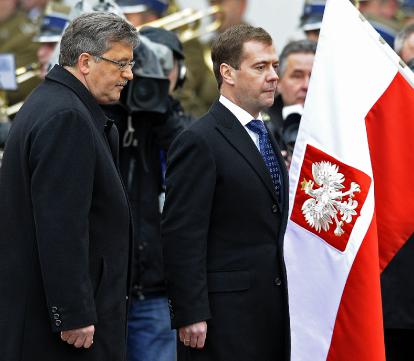
Stalin’s Shadow Hangs Over Medvedev’s Modernization
Publication: Eurasia Daily Monitor Volume: 8 Issue: 70
By:

One year ago, the plane carrying President Lech Kaczynski and scores of Polish officials crashed 100 meters from the runway hidden by dense fog in Smolensk oblast. On April 11, President Dmitry Medvedev and his Polish counterpart Bronislaw Komorowski will visit the site of this catastrophe. Russian-Polish relations have distinctly improved during the past year not only because of Moscow’s readiness to cooperate in the joint investigation but primarily owing to the honest admission of the facts about the massacre of Polish officers in Katyn in 1940 (www.gazeta.ru, April 8). That crime was acknowledged as a part of the greater tragedy of Stalin’s terror that destroyed millions of Soviet citizens and deeply traumatized the national psyche. The need to internalize that tragedy informed the proposal on establishing a national program for commemorating the memory of the totalitarian regime’s victims and for national reconciliation prepared by the Presidential Council for Civil Society and Human Rights (Rossiyskaya Gazeta, April 7).
Mikhail Fedotov, who chairs the council, argues that the proposed program should not be labeled as “de-Stalinization” because it involves a wider range of practical steps aimed at the remnants of totalitarian mentality, including the erection of monuments to the victims of repression (Ekho Moskvy, April 5). In doing so, the program has instantly attracted furious criticism from die-hard communists and nationalists of every persuasion. The critics condemn the attempt to belittle the achievements of the Soviet people and mar the memory of generations inspired by the Socialist ideal (RIA Novosti, March 31, www.regnum.ru, April 8). Instead of downplaying the controversy, Sergei Karaganov, who heads the working group that drafted the proposal, has launched a spirited offensive arguing that modernization could only begin in the head, while true patriotism must include learning from past tragedies (Nezavisimaya Gazeta, April 1). Many liberal experts see the need to move from a shouting match to a meaningful debate on the program, focusing particularly on the idea of denying totalitarian crimes an offense leading to immediate dismissal in the case of a state official (Moskovskiy Novosti, April 7; Vedomosti, April 8).
Medvedev finds himself walking on thin ice while the proposal is circulating in the presidential administration despite his own instruction to create a working plan of high importance for Russia, according to Fedotov (Nezavisimaya Gazeta, April 5). One year ago, Medvedev felt confident to speak about “unforgivable crimes” and condemn Stalinism as “totalitarian dictatorship.” Now, however, political stakes are much higher and the risk of alienating a significant part of the electorate appears prohibitive (Izvestiya, May 8, 2010). Medvedev has boldly asserted his authority in setting the course, ambivalent as it is, in the international management of the Libyan crisis. Several officials who dared to deviate from this course were swiftly dismissed (www.gazeta.ru, April 5). He has also insisted on replacing ministers on the boards of state companies, targeting specifically Deputy Prime Minister Igor Sechin (Kommersant, 5 April). Medvedev is, however, wasting an opportunity to shape the course of public debate at the very heart of his modernization agenda.
Prime Minister, Vladimir Putin, prefers to stay clear of these debates knowing that Medvedev can only challenge the mainstream discourse of patriotic pride in Russia’s history at his own peril. He is perfectly aware of the pronounced pro-totalitarian attitude not only among the veterans but in the younger generations as well, so that even the most unbiased opinion polls show a positive opinion of Stalin in about a half the respondents, and negative – in only one third (www.levada.ru, March 30). This blindness to the undeniable crimes of Stalinism is caused not by the lack of information but by the organic compatibility of the present-day political system of over-centralized executive power and economic state control with the dictatorship that was denounced but maintained by Nikita Khrushchev 55 years ago. It is this implosion that remains the gravest danger on Putin’s mental map, while Stalin’s terror falls into the category of “excesses.”
One institution in his system of power that is proud of its Soviet heritage is the security services, which may have grown deeply corrupt but still insist on their right to decide what the interests of state security are. One anecdotal reminder was the idea to ban the use of Skype, Gmail and Hotmail in Russia, which was articulated last week and dropped, but not before Putin’s press-secretary confirmed that the Federal Security Service (FSB) position had “good reasons” (Kommersant, April 9). Putin has orchestrated the rapprochement with Poland but is firm in denying the responsibility of the NKVD (KGB forerunner) for the Katyn massacre; hence the embarrassing scandal involving the replacement of the memorial plate on the site of the air-crash, so that it contains no mention of Katyn (www.newsru.com, April 10).
One Soviet leader who was able to break free from the confines of Stalinism and is now dismayed at the resurrection of oppressive kleptocracy is Mikhail Gorbachev (The New Times, February 28). Last week he celebrated his 80th birthday, and many Western and Russian celebrities gathered to express their admiration of his integrity in making hard choices that fostered the advance of freedom (www.gazeta.ru, April 5). The gala-event took place in London, and not a single Russian politician was present because Gorbachev is not forgiven for rejecting the lies that camouflaged the bankruptcy of totalitarianism.
Medvedev resembles Gorbachev somewhat in his smooth talking about reforms and modernization but is nowhere close in his readiness to take responsibility for unpopular decisions or in understanding that there is such a thing as moral imperative. De-Stalinization has emerged as a crucial test for his leadership, but he is clearly failing it. Fedotov and Karaganov have few illusions about whether the proposal can be implemented in an election year, but Medvedev still apparently cherishes the illusion that a second term might be in the cards for him. The position of stability-provider is, however, occupied by his senior partner, who excels at saying to bureaucrats and pensioners as well as siloviki exactly what they want to hear. Medvedev needs to discard this discourse of comfortable lies, but the right words escape him.




